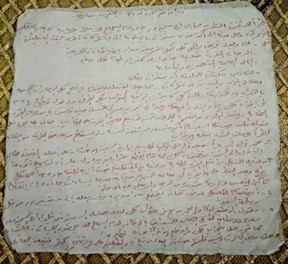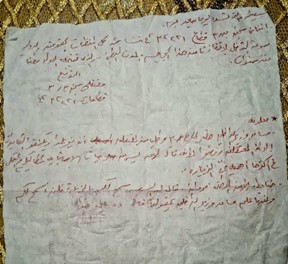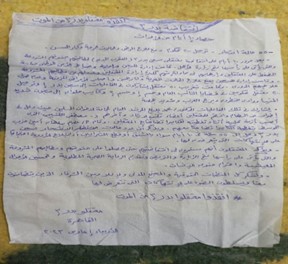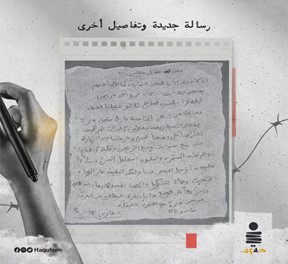A series of leaked notes from detainees in Egypt's Badr Prison, advertised as a newly reformed complex, details gross conditions and ill treatment
(Washington, D.C., March 8, 2023) The UN Human Rights Council should investigate newly revealed allegations of serious abuses in the notorious Badr prison, said Democracy for the Arab World Now (DAWN). Three leaked letters from detainees inside Wing 3 of Badr prison, verified by DAWN in an interview on March 6 with a source with friends and family detained inside Badr, confirms reports of widescale mistreatment and attempted suicides in the complex.
"The leaked messages from Badr prison detailing horrific abuses highlights both the growing desperation inmates feel and the utter failure of El-Sisi's alleged prison reforms" said Jon Hoffman, Research Director at DAWN. "The revelations of gross conditions inside the complex are emblematic of wider, systemic abuses continuing in prisons across all of Egypt and deserve close examination."
The first undated detainee letter smuggled out of Badr 3 prison wing surfaced in late February and details several ongoing abuses taking place within the prison complex, including the prolonged prohibition of visits for detainees, inadequate nutrition, deteriorating health conditions, and denial of medical services. According to the leaked note, following a cell raid by security forces inside the prison, one prisoner, Hassam Abu Shorouk, hanged himself, and two others – Mohamed Turk Abu Yara and Awad Noaman – attempted suicide by slitting their wrists; they were transferred to the prison hospital.


Simultaneous with the release of the leaked note, family members of Awad Noaman, a detainee in Badr prison, posted on social media confirming the reports of his attempted prison suicide. Noaman's wife stated that she went to Badr prison following the reports of his attempted suicide and asked prison administrators about his condition. She said they denied he attempted suicide but prevented her from confirming this or communicating with him. According to the note, another detainee, going by the name "Ta," suffered a heart attack following the raid, and his whereabouts are likewise unknown. A different prisoner, Dr. Mohamed Badi, recently began a hunger strike to protest mistreatment inside Badr prison, according to the letter. These particular incidents were not dated in the leaked letter, and the whereabouts of these five inmates are currently unknown. In an interview with DAWN, the same source that verified the authenticity of the letter stated that prison authorities are preventing outside communication with family members, lawyers, or media.
Two additional leaked letters, dated March 1 and March 2, respectively, surfaced in early March and attest to continued abuses underway inside the prison. The second letter states that prison authorities continue to deny medical services to detainees despite the deteriorating health of numerous prisoners, particularly the elderly. The letter also claims that over the past ten days since its signing (March 1), 55 prisoners inside Badr 3 prison wing attempted suicide due to the poor conditions they face inside the complex. According to the note, several detainees, including the General Guide of the Muslim Brotherhood, Dr. Mohamed Badie, are continuing their hunger strikes to protest these poor conditions. The third letter explains that prison authorities are beginning to move some detainees to different complexes in the effort to break such acts of protest. It states that prison authorities continue to deny medical care to detainees who are in critical need of medical assistance. In response, prisoners are now burning their blankets to protest continued abuses, according to the third note.

There have been myriad, detailed investigations into the inhumane conditions and torture endemic across prisons in Egypt, which, according to one such comprehensive investigation by Human Rights Watch, likely amount to crimes against humanity. Another such investigation, carried out by Amnesty International, details extensively how inhumane detention conditions and lack of adequate medical services in Egyptian prisons directly result in the widespread suffering – and at times, deaths – of detainees. The leaked Badr prison letter is consistent with these findings, and suggests the same abuses are ongoing.

In 2021, President El-Sisi announced the launch of a new "National Human Rights Strategy," which included plans to "modernize" prisons in Egypt. As part of these efforts, he announced the opening of new prisons across Egypt to be designed after the "American model," namely to ensure the protection of the health and welfare of prisoners. Badr prison is one of these new complexes. Hailed as a model for "reform," Badr prison, located outside of Cairo, opened in 2022 and detains political activists across the ideological spectrum in Egypt, including leaders of the Muslim Brotherhood. Despite the government propaganda about it, conditions inside Badr prison are horrific and inhumane: torture is endemic, prisoners are denied contact with their families or lawyers, and proper medical services are routinely denied to inmates. Since its opening, at least five prisoners inside Badr prison perished due to medical negligence and poor detention conditions.
"Badr prison symbolizes the failures of the El-Sisi government and its blatant disregard for the rights and lives of the Egyptian people," said Hoffman. "Prisoners suffering the worst deprivations are risking their lives, torture, and brutal retaliation to let the world know that they're suffering; the very least we can do is demand an international investigation."
DAWN urges an impartial, independent investigation into the allegations of abuses taking place inside Badr prison, including a visit to the complex. The UN Human Rights Council should organize an inquiry to lead this effort, conducting a comprehensive investigation into the widespread and systemic abuses taking place within prisons across Egypt.





































